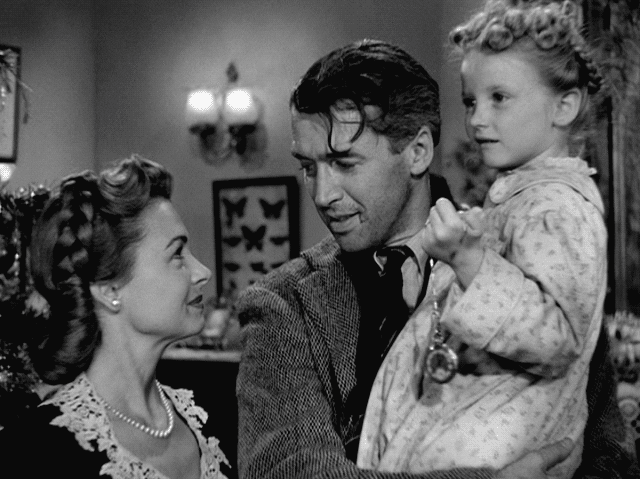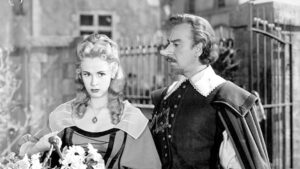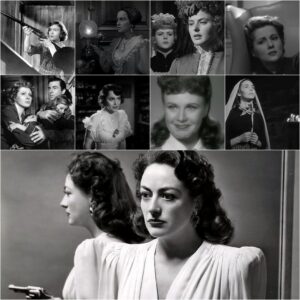It’s a Wonderful Life (1946)

…………………………………………………
It’s a Wonderful Life Movie Review
It’s a Wonderful Life is a 1946 fantasy drama film directed by Frank Capra and starring James Stewart. It is one of the greatest movies ever made.
………………………………………………….
“Attaboy, Clarence“
………………………………………………….
………………………………………………….
When a frustrated businessman George Bailey becomes suicidal, an angel from heaven is sent to him. To change his heart, he shows him what life would have been like without his existence. Obviously somewhat based on Dickens’ famous novella ‘A Christmas Carol’, this movie is very much the most positive and uplifting movie that Frank Capra has ever made, which says a lot as he was the master of such life-affirming cinema.
When people say that they don’t make ‘em like they used to, that is usually an overstatement, but this movie is the quintessential example of all the things that got lost in modern cinema – a sense of magic, inspiring messaging and positivity. Whether you watch it as an unrealistic, earnest drama or a fairy tale, you are undoubtedly going to be moved by it, and people who don’t rate this particular film with five stars have no soul in my opinion.
This is definitely a Christmas movie and a spiritual one, which I usually don’t gravitate toward, but no matter what your religious persuasion is, you are bound to be inspired by this deeply heartfelt story about the utmost importance of living your life to the fullest and not giving up no matter what. Capra says that suicide is the ultimate sin and I agree with that wholeheartedly.
………………………………………………….
………………………………………………….
Modern movies would unquestionably end with George’s suicide while this one ends with a fairy tale happy ending. Real life lies somewhere in the middle as is always the case – in real life George would be disheartened and beaten by life, but would continue to live and find purpose despite all odds. But I would much rather have this extremely joyous ending than a bad one as it’s important for movies to instill magic and inspiration to us all. That final line about angels was just so touching and George winking at Clarence warmed my heart. It was the perfect way to end this story.
There is also a definite anti-capitalist sentiment to this movie that was surprisingly prevalent upon my second viewing. I don’t quite know how Capra got away with it in the capitalist hellhole that is America, but I am glad that he did and his socialist ideas are beautiful to witness, though unrealistic in the areas of finance and economics. The depiction of this horribly ruthless, heartless businessman who holds the monopoly over the entire town has only become more relevant with time. It was a terrific choice to have him remain villainous and not change for the better right up to the very end. Lionel Barrymore was very effective and memorable as Henry Potter.
This cast of great actors did a stupendous job. Other highlights include Beulah Bondi as the sweet mother, Thomas Mitchell as the likable uncle and the perfectly cast Henry Travers in the role of Clarence the angel. The dynamic between Clarence and George was phenomenal and he was the heart of the story. Those fantastical elements fully worked, in particular the scene where George is transported to a world where he was never born is unforgettable and by far the most striking part of the entire movie.
………………………………………………….
………………………………………………….
Donna Reed was also wonderful as the love interest. This film is surprisingly romantic and this is something that’s often not talked about when analyzing this masterpiece. The scene where they walk around and talk about the moon was inherently poetic. The lightweight, screwball dynamic between the two was wonderful to witness. In actuality, the entire first half is very lightweight in contrast to the much darker and deeper latter half, but it worked as it also contained a lot of fantastic humor that was achieved through wonderful writing and incredible dialogue.
The acting standout is obviously James Stewart, who has never been better than he was here in his most iconic role. George Bailey is an instantly iconic, Dickensian character that is superbly written and we get to see his entire life story from childhood to adulthood. He isn’t unrealistic as upon serious misfortune he becomes cynical and bad-tempered, but eventually with a little bit of help from Clarence he returns to his charming, positive and charismatic self. Stewart was infinitely likable and effervescent here while selling all the dialogue and the emotional beats effortlessly. This was his magnum opus and it’s a travesty that he lost his deserved Oscar this year.
………………………………………………….
………………………………………………….
It’s a Wonderful Life has a great holiday and magical feel to it while also emphasizing the importance of friendship and community, which are for the most part lost in today’s alienated world. Taking care of yourself and not just others is also an important message for all times. Frank Capra’s directing is top-notch and the editing and pacing are uniformly superb – the film is over two hours yet it never felt long, but consistently riveting. The score is also wonderful and the black-and-white cinematography was absolutely mesmerizing while benefiting from a great use of shadows and contrasts to characterize certain darker plot points.
Consequently, It’s a Wonderful Life is an absolute classic. This is the type of inspirational story that has only become more important in today’s embittered, cynical world. It’s a tale that is life-affirming and deeply heartfelt as Capra teaches us about the importance of living your life to the fullest and never giving up. He also showcases just how crucial friendship and community are and how dangerous capitalism is. The black-and-white cinematography here is gorgeous and highly accomplished while the script is tightly constructed and constantly engaging. James Stewart delivered his career-best, defining performance in such a phenomenal role. For all these reasons, It’s a Wonderful Life is undoubtedly one of the greatest films of all time.
My Rating – 5












